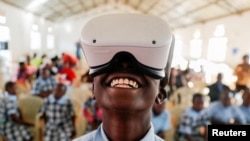Until now, Apple, the company best known for iPhones, has limited its augmented-reality efforts to technology that works on existing devices, for instance by enabling retailers' apps to show virtual furniture in a customer's living room.
Analysts say that the new Apple virtual reality (VR) device, which Bloomberg has reported could cost near $3,000 and look like a pair of ski goggles, is a place holder of sorts.
The Cupertino, California, company's grand vision remains to produce a pair of transparent glasses that overlay digital information on the real world and can be worn all day, every day, those analysts say, but in the face of competition, it decided to launch its own goggles.
The technology for Apple glasses remains years away, and in the meantime, Apple's rivals such as Sony Group Corp. and Pico, which is owned by TikTok parent ByteDance, have released mixed-reality headsets that hint at what is possible by blending the real and virtual worlds.
Meta Platforms this week announced its "Quest 3" headset for $500, after last year's release of the Quest Pro, which sells for $1,000.
Apple CEO Tim Cook and Meta Platforms Inc's CEO, Mark Zuckerberg, are jockeying to define how consumers will put to use a new generation of technology where real and digital worlds converge.
Zuckerberg has laid out a vision of the "metaverse," a parallel digital universe where people will gather together to work and play, and has had products out for years.
Part of the reason Apple has kept its efforts private, analysts say, is that no one in Silicon Valley is quite sure how people will eventually use mixed- or augmented-reality technology, which industry insiders call "XR" for short. There is no "killer app" for the device yet.
Rather than target a mass-market price point, Apple appears to be readying a premium device that is aimed at showing software developers what is possible so they can come up with compelling apps.
"No one there believes this market is anywhere near ripe in the foreseeable future," said Ben Bajarin, chief executive and principal analyst at Creative Strategies.
The biggest risk for Apple is putting its reputation for polished products on the line while engaging in a costly battle with Meta for dominance over a market that barely exists yet.
Last year, Meta had 80% of an overall market for augmented- and virtual reality headsets that was just 8.8 million units, according to data from research firm IDC. By contrast, IDC estimates that Apple alone sold 226 million iPhones.
While Meta has products on the market, Apple has major advantages in defining the emerging field among software developers, said Jitesh Ubrani, a research manager who tracks the XR market at IDC. Apple has strong relationships with developers who want to access an installed base of 2 billion devices that spans Macs, Apple Watches, iPhones and more.
"They can leverage that ecosystem they've already built to keep users within their walled garden," Ubrani said. "And Apple is in a much better position to give you an experience that works across devices than Meta is."









Forum